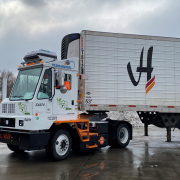Driving Rural Innovation: Orange EV’s Push for USDA Support
By Austin Taylor
In the world of freight and agriculture, the work never stops. Whether on a farm, in a distribution yard, or at a processing facility, heavy equipment is constantly in motion, keeping supply chains running and businesses afloat. But while innovation has transformed nearly every aspect of agriculture, one critical piece of the puzzle has remained largely unchanged: the terminal truck.
That’s where Orange EV is stepping in. As a leader in electric terminal trucks, the company is working to change the way farmers and rural businesses move goods. Their efforts go beyond just building better trucks — they’re pushing for policy changes that could open new doors for rural communities. Orange EV is advocating for terminal trucks of all kinds to be officially recognized under U.S. Department of Agriculture (USDA) programs, which would make them eligible for funding and incentives designed to support rural industries.
For farmers and agricultural businesses, this kind of recognition would be a game changer. Terminal trucks play a critical role in moving heavy loads around processing centers, storage facilities and transport hubs. Traditionally, these trucks have relied on diesel engines, which come with high fuel costs, frequent maintenance needs and emissions that impact workers and the environment. Orange EV’s technology offers an alternative that can operate just as effectively while reducing long-term costs and improving air quality.
The push for USDA support is about more than just one company’s success. It’s about ensuring rural businesses have access to the same advancements that are reshaping urban and industrial freight operations. Many federal programs exist to help farms and agricultural enterprises modernize their operations, but terminal trucks are not yet widely recognized as eligible equipment. Changing that would mean more farmers and agribusinesses could secure funding to adopt newer, cleaner and more cost-effective technology.
Orange EV is no stranger to proving the value of their approach. In partnership with Metropolitan Energy Center (MEC), they’ve already deployed electric terminal trucks in multiple locations, demonstrating their reliability and efficiency. Their work has shown these vehicles are not just a niche solution, but a practical, scalable option for businesses of all sizes, including those in rural America.
Gaining USDA support isn’t just about expanding access to electric vehicles — it’s about leveling the playing field. Farmers and rural industries shouldn’t be left behind when it comes to technological progress. With the right policy changes, equipment that makes operations cleaner, cheaper and more efficient could soon be within reach for agricultural businesses across the country. Orange EV’s advocacy is paving the way for that future, one where America benefits from American innovation

